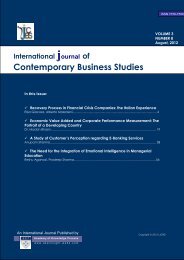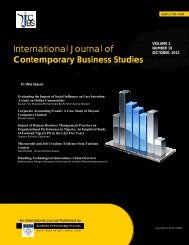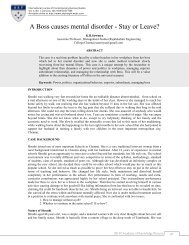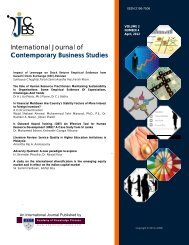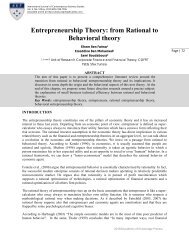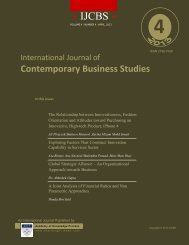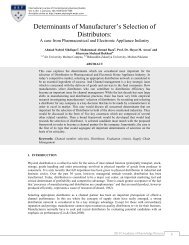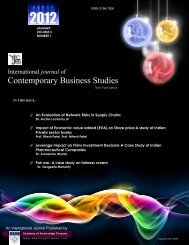Contemporary Business Studies - Academy of Knowledge Process ...
Contemporary Business Studies - Academy of Knowledge Process ...
Contemporary Business Studies - Academy of Knowledge Process ...
You also want an ePaper? Increase the reach of your titles
YUMPU automatically turns print PDFs into web optimized ePapers that Google loves.
International Journal <strong>of</strong> <strong>Contemporary</strong> <strong>Business</strong> <strong>Studies</strong>Vol: 4, No: 2. February, 2013 ISSN 2156-7506Available online at http://www.akpinsight.webs.comand sort data. No doubt, the accounting pr<strong>of</strong>ession is witnessing major changes due to changes intechnology. As it pertains to investigative accounting, “the modern digital environment <strong>of</strong>fers newopportunities for both perpetrators and investigators <strong>of</strong> fraud. The increasing rate <strong>of</strong> computer-basedfinancial crime has created a huge demand for the skills and services provided by FA’s.” Furthermore, wefully support the view point <strong>of</strong> Debreceny and Farewell (2010) that “the eXtensible <strong>Business</strong> ReportingLanguage (XBRL) be integrated across the accounting curriculum, in a manner relevant to the temporalstage and content <strong>of</strong> particular courses within the curriculum.” Several countries have adopted XBRL in avariety <strong>of</strong> information value chains, notably in the USA context the Securities and ExchangeCommission’s interactive data program and in Indian context, “Corporate Filing and DisseminationSystem (CFDS)” used by SEBI from 2010. Thus, XBRL/CFDS has implications for the totality <strong>of</strong> theaccounting curriculum and pedagogy. A program for the integration <strong>of</strong> them across a typical accountingcurriculum should be developed soon (Efiong, 2012).The degree <strong>of</strong> pr<strong>of</strong>essional skepticism auditors currently employ differs from the level used by FA’s. Thisis primarily why the AICPA and education leaders have called for “more forensic accounting educationfor auditors” (Arens and Elder, 2006). In addition, the PCAOB has emphasized that the detection <strong>of</strong> fraudshould be an important objective <strong>of</strong> an audit (Carpenter, 2007). Despite the depth and breadth <strong>of</strong>authoritative standards available to guide accountant and auditor conduct, numerous stories in the press,as well as, academic research indicate that these standards have not been completely successful ineliminating ethical violations by accountants. Because <strong>of</strong> these continued breaches, confidential reportingmechanisms have received significant attention in recent years.From the results <strong>of</strong> our analysis, we discovered that the different types <strong>of</strong> financial and economic crimesprevailing in the Indian economy include the corporate accounting frauds, security market scams, bankfrauds (like ATM/credit card frauds, checks frauds, fraudulent fund transfers, withdrawals, presentation <strong>of</strong>stolen dividend warrants, and improper granting <strong>of</strong> credit facilities, inflated contract prices, embezzlementetc. The increasing demands in the current regulatory, legal, and business environments should stimulateaccounting programs to emphasize and embrace forensic accounting. This research surveyed in 2011-12120 potential practitioners, academics, and prospective users <strong>of</strong> forensic accounting services from NCRregion (viz., Delhi, Gurgaon and Ghaziabad from India) as representative <strong>of</strong> the entire country todetermine whether there are differences in views <strong>of</strong> the relevant skills suggested in the literature. Thenecessary skills required by FA’s in India have been empirically examined and we have realized thatfinancial and economic crimes have reached a level that special skills (such as those derivable fromforensic accounting skills) set are required.This study is a ‘preliminary’ investigation <strong>of</strong> the necessary skills, education requirements, and trainingrequirements for FA’s. We surveyed academics, practicing fraud and forensic pr<strong>of</strong>essionals in orderdetermine the perceptions <strong>of</strong> the pr<strong>of</strong>essional community. Since little research exists in this area, presentresearch is ‘exploratory’ in nature. The results indicate that “potential practitioners and academic agreethat critical thinking, unstructured problem-solving, investigative flexibility, analytical pr<strong>of</strong>iciency, andlegal knowledge are more important skills <strong>of</strong> FA’s. Potential practitioners <strong>of</strong> forensic accounting servicesrated analysis the more important than did academic staff. However, both groups agreed with prospectiveusers, who viewed deductive analysis as very important. The groups did not differ on oralcommunication, written communication, or composure rankings.” These results show that “some skillsare relevant and important to the outcome <strong>of</strong> forensic accounting education. Educators can use these skillsas a guide to direct academic curriculum with the proper learning outcome objectives.” Also, discoveredare “the most important skills required by FA’s to include effective written communication, auditingskills and oral communication. The least important skills include understanding the goal <strong>of</strong> a case, solveunstructured problems, and synthesize results <strong>of</strong> discovery and analysis.” In correlating the importantskills as identified by our respondents, it was found that critical thinking, sociology and understanding thegoal <strong>of</strong> the case highly correlated to each other, likewise effective written communication, psychology,2013©<strong>Academy</strong> <strong>of</strong> <strong>Knowledge</strong> <strong>Process</strong>78



